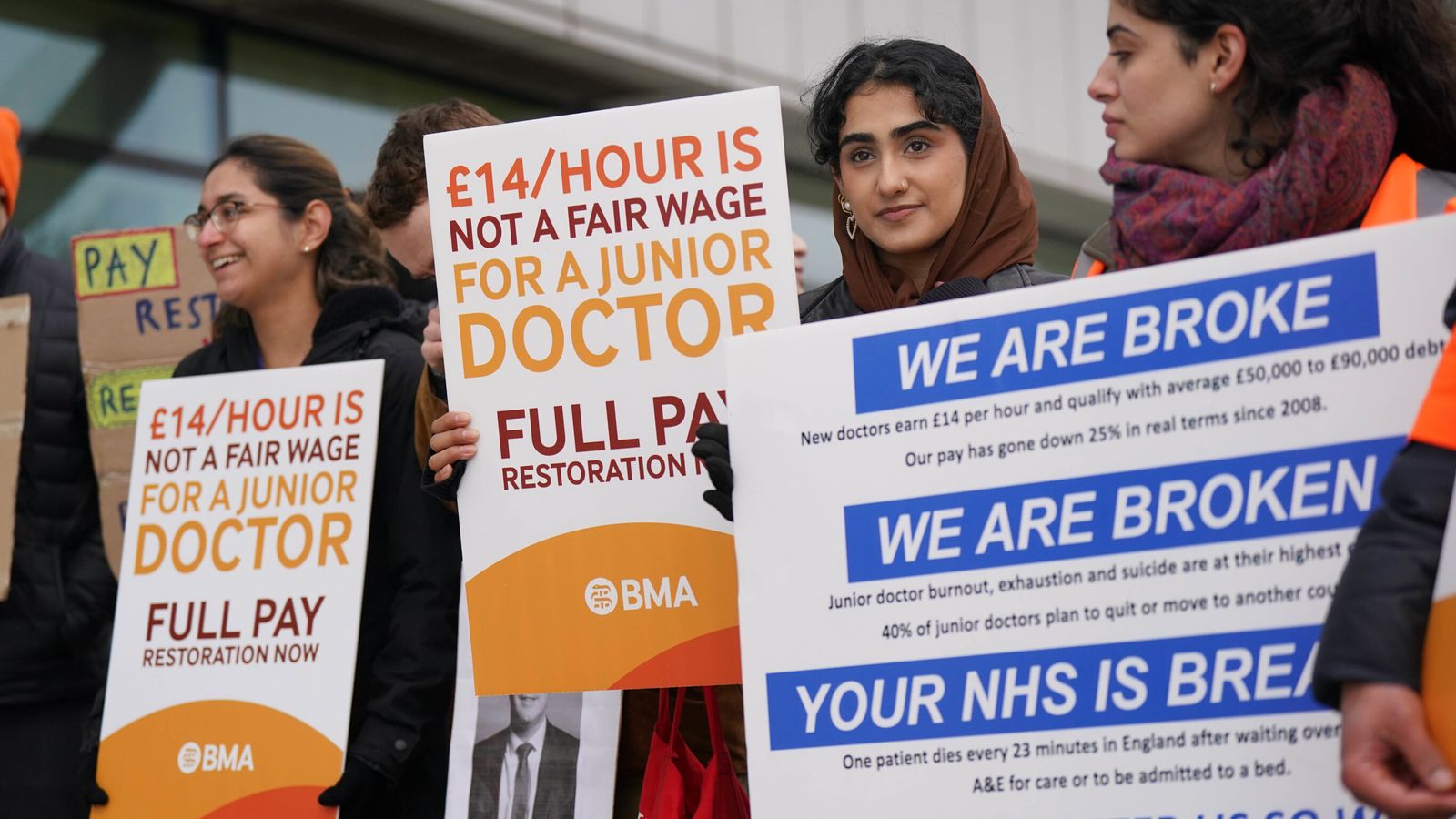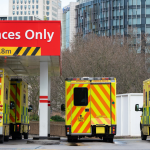This is a pivotal week for the NHS, for health workers, for patients, and for the government.
It starts with junior doctors launching their four-day strike at 7am tomorrow morning, leading to what England’s top doctor Stephen Powis described as “unprecedented disruption” that will bring “immense pressure on services”, and it ends with the two biggest health unions, Unison and the Royal College of Nursing, closing their ballots on the government’s new pay offer.
The NHS Confederation estimates as many as 350,000 appointments and operations could be cancelled this week – double the amount seen during the first junior doctor strikes in March.
Senior consultants at the West Middlesex Hospital in south west London are stepping in to help cover the shortage of staff.
Dr Sanjay Krishnamoorthy is the clinical director for urgent and emergency care. He told Sky News: “It is going to be a period of significant disruption.
“Junior doctors make up about 50% of our workforce and if they are not going to be there, we will need consultants to come and cover those shifts to ensure patient safety.”
“There will be a long-term impact.
“We will be prioritising emergency admissions. We’ll be prioritising emergency surgery, we’ll be prioritising cancer care, care for children, intensive care patients.
“But there will be patients who will have their care postponed, which will be very frustrating for patients up and down the country, and there will be a period where we will have to work exceptionally hard to try and get through that backlog of patients which we know exists even at this time without the strike action.”
Please use Chrome browser for a more accessible video player
Read more:
Why this could be the worst NHS strike yet
Emergency and urgent care to be prioritised
‘Militant’ junior doctors accused of seeking ‘maximum disruption’
Dr Krishnamoorthy says the title “junior doctor” is a misnomer and that they are an “exceptionally valuable” member of the hospital’s workforce: “They are the doctors who see you when you first come into hospital.
“These are doctors who are from immediately graduating out of university all the way to doctors just before they become a consultant.
“These will be doctors who would be independently performing surgeries. We need the junior doctors, the very skilled workforce, and we are dependent on them in terms of day-to-day management.
“We have consultants who will be president and who will be able to prioritise patient safety, but there will be an impact for patients.”
Be the first to get Breaking News
Install the Sky News app for free
The strikes will put further pressure on a healthcare system still trying to rebalance itself in a post-pandemic world living with COVID.
Each month another part of the COVID apparatus gets dismantled: The ONS infection survey has ended, the designated NHS app will close at the end of this month, and countries including Germany and the US are announcing that the pandemic is over.
But its legacy means that the NHS is seeing pressures usually reserved for the winter all year round.
Dr David Shackleton is an A&E consultant at West Middlesex Hospital and says attendances are the highest they’ve ever been. “It is busy all the time now, we’ve come through COVID, but demand is the highest it’s ever been and that’s true across the health service,” he said.
“GPs are seeing more patients than ever. We’re really trying to work hard to see people that are coming through the door every day, the waiting times are longer and our job is to see the sickest people as soon as we can, but it’s getting worse and worse.”
The BMA union has moved the ballot for a separate consultants’ strike in England from April to May after “constructive talks with the Treasury” and “positive discussions” with Health Secretary Steve Barclay, but there has been no such movement or indication of a mutual understanding in the government’s stand-off with junior doctors.
Writing in the Sunday Telegraph, Mr Barclay said: “The Junior Doctors Committee is calling for a pay increase of 35 per cent. This demand is widely out of step with pay settlements in other parts of the public sector at a time of considerable economic pressure on our country.
“A salary hike of this size would see some junior doctors receiving more than an extra £20,000 a year. I value the important work these doctors do every day, and I want to see a fair deal that increases their pay.”
The Department for Health is also waiting to hear whether the other health unions have been successful in their attempts to sell the new negotiated pay offer to their members.
The ballot for the Royal College of Nursing closes on Friday morning, and Unison’s closes in the afternoon, both will then confirm the outcome to the NHS staff council before informing the government.
Union leaders are keen for the pay offer to be accepted, concerned they won’t get an improvement and any rejection could see the process be referred back to the NHS Pay Review Body. It’s not a sure thing.
Even on the day the negotiated offer was announced there was an acceptance behind the scenes that some unions might struggle to effectively sell it to their members, leaving open the prospect of even more health worker strikes in the future.






















